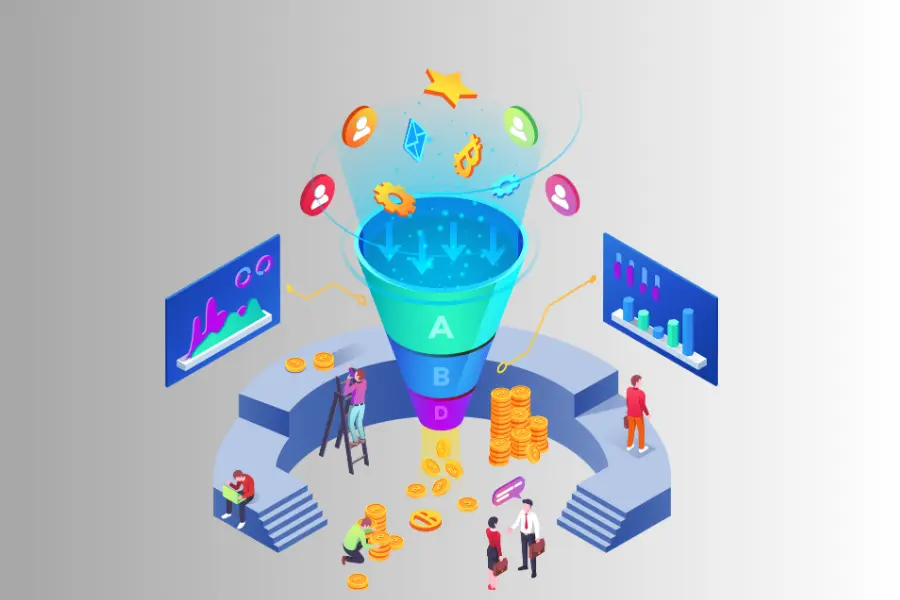Leveraging Chatbots for Streamlined Lead Nurturing and Sales Funnel Management
In today’s fast-paced digital world, businesses are constantly seeking ways to enhance customer engagement, streamline processes, and drive sales. One of the most effective tools to achieve these goals is the use of chatbots. By leveraging chatbots for lead nurturing and sales funnel management, companies can automate interactions, provide instant responses, and create a seamless customer journey. This blog explores how chatbots can transform lead nurturing and sales funnel management, driving efficiency and boosting conversion rates.

The Role of Chatbots in Modern Business
Chatbots, powered by artificial intelligence (AI) and machine learning, are software applications designed to simulate human conversation. They can engage with users through text or voice, providing information, answering questions, and guiding them through various processes. Chatbots have become an integral part of customer service, marketing, and sales strategies due to their ability to operate 24/7 and handle multiple queries simultaneously.
Benefits of Using Chatbots for Lead Nurturing
Lead nurturing involves building relationships with potential customers at every stage of the sales funnel. Chatbots play a crucial role in this process by providing timely, relevant, and personalised interactions.
- Immediate Response and Engagement: Chatbots can engage with leads instantly, answering queries and providing information without delay. This immediate response reduces the chances of losing potential customers due to slow follow-ups.
- Personalised Interactions: Advanced chatbots can analyse user behaviour and preferences to deliver personalised messages and recommendations. This tailored approach helps in building a stronger connection with leads, increasing the likelihood of conversion.
- 24/7 Availability: Unlike human agents, chatbots are available round-the-clock, ensuring that leads receive assistance and information whenever they need it. This constant availability can capture and nurture leads from different time zones and regions.
- Efficient Data Collection: Chatbots can collect valuable data from interactions, such as contact details, preferences, and pain points. This data can be used to segment leads and tailor future communications, enhancing the effectiveness of marketing campaigns.
Enhancing Sales Funnel Management with Chatbots
The sales funnel comprises several stages, from awareness and consideration to decision and purchase. Chatbots can streamline this process by guiding leads through each stage efficiently.
- Top-of-Funnel Engagement: At the awareness stage, chatbots can provide information about products or services, answer frequently asked questions, and direct visitors to relevant content. This engagement helps in capturing interest and moving leads to the next stage.
- Middle-of-Funnel Nurturing: During the consideration stage, chatbots can offer personalised product recommendations, share case studies, and schedule product demos or consultations. This personalised approach helps in nurturing leads and addressing their specific needs.
- Bottom-of-Funnel Conversion: At the decision stage, chatbots can assist in completing transactions, providing discounts or special offers, and answering any last-minute questions. This support can help in converting leads into customers seamlessly.
- Post-Purchase Engagement: After the purchase, chatbots can offer support, gather feedback, and provide information about related products or services. This post-purchase engagement helps in building customer loyalty and encouraging repeat business.
Case Studies of Successful Chatbot Implementation
- H&M: The fashion retailer H&M uses a chatbot on its website and app to help customers find products, check availability, and make purchases. The chatbot provides personalised recommendations based on user preferences, enhancing the shopping experience and driving sales.
- Sephora: Sephora’s chatbot assists customers with product recommendations, booking in-store appointments, and providing makeup tutorials. By offering personalised interactions, the chatbot helps in nurturing leads and converting them into loyal customers.
Best Practices for Implementing Chatbots
- Define Clear Objectives: Identify the specific goals you want to achieve with your chatbot, such as lead generation, customer support, or sales.
- Integrate with CRM Systems: Ensure your chatbot integrates with your Customer Relationship Management (CRM) system to track interactions and update lead information automatically.
- Continuously Optimise: Monitor chatbot performance regularly and use analytics to identify areas for improvement. Update the chatbot’s responses and capabilities based on user feedback and evolving needs.
- Maintain a Human Touch: While chatbots are highly efficient, it’s important to provide an option for users to connect with human agents when needed. This ensures that complex queries and concerns are addressed effectively.
Chatbots are transforming the way businesses nurture leads and manage sales funnels. By providing immediate, personalised, and 24/7 engagement, chatbots enhance the customer journey and drive conversions. As AI technology continues to advance, the capabilities of chatbots will only improve, making them an indispensable tool for modern businesses. Embracing chatbots can streamline your lead nurturing and sales funnel management processes, ultimately boosting efficiency and sales.
Active Events
3 Essential Projects to Elevate Your 5c of Content Marketing Portfolio
Date: Feburary 25, 2025 | 7:00 PM(IST)
7:00 PM(IST) - 8:10 PM(IST)
2432 people have registered
Best Tips to Create a Job-Ready Data Science Portfolio
Date: Feburary 26, 2025 | 7:00 PM(IST)
7:00 PM(IST) - 8:10 PM(IST)
2811 people have registered
Bootcamps
Digital Marketing Bootcamp
- Duration:4 Months
- Start Date:Feb 9, 2025
Data Science Bootcamp
- Duration:4 Months
- Start Date:Feb 9, 2025
